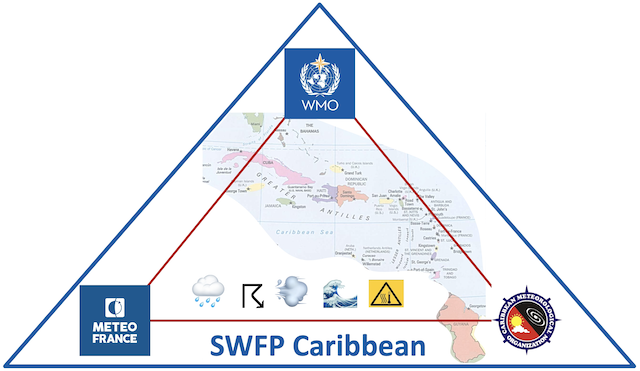
The idea of expanding the WMO Severe Weather Forecast Demonstration Project (SWFDP) to the Eastern Caribbean area had been discussed in 2015 and 2016 by the WMO Regional Management Group for North America, Central America and the Caribbean. The concept was promoted by the representative of the Caribbean Meteorological Organization (CMO) and British Caribbean Territories within that Group. In mid-2016, a formal request was made to WMO to expand its SWFDP to this region, recognizing that the States and Territories that would be most impacted and involved had already been reviewing existing components that are promoted under the SWFDP concept, such as (i) the implementation of the Common Alerting Protocol ( CAP) standard; and (ii) Impact-based Weather Forecasts and Warnings.
The Regional WMO Management Group decided to build on the existing collaboration between CMO and the French Meteorological Service (Météo-France), particularly those elements that could be built into a SWFDP, such as coordination among Meteorological Services. CMO and Météo-France had signed a set of formal "Working Arrangements" in June 2016 to govern the scientific and technical collaboration between the two institutions.
The Severe Weather Forecasting Programme Caribbean (formerly Severe Weather Forecast Demonstration Project Eastern Caribbean) envisages a key role for the Météo-France operations in Martinique. The Programme is being developed along the following lines:
An initial Expert Group, along with other invited experts, held project formulation meetings in Martinique (December 2016) and Florida (May 2017). The group developed the Implementation Plan in preparation for a 2018 commencement of activities. The Expert Group was designated as the Regional Sub-Programme Management Team (RSMT) to guide the SWFP and its eventual transition from a project to an operational phase. Once the operational phase is reached, a regional entity would be required to manage the programme activities. The RSMT and the WMO Secretariat agreed that the Caribbean Meteorological Organization (CMO) and Partners will be the regional entity to support SWFP in the operational phase.
The SWFP Regional Sub-programme Management Team, comprises the following members:
• Mr Emmanuel Cloppet, Météo-France, Martinique (Co-Chair),
• Dr Arlene Laing, CMO Headquarters (Co-Chair),
• Mr Joseph Isaac, Meteorological Service of Sint Maarten,
• Mr Dale Destin, Antigua & Barbuda Meteorological Service,
• Mr Daniel Brown, NOAA/NHC, RSMC Miami,
• Mr James Nelson, NOAA/Weather Prediction Center,
• Mr Andre Giguère, Environment and Climate Change Canada, and
• Ms Kathy-Ann Caesar, CIMH.